#Court record database
Explore tagged Tumblr posts
Text
EFF’s lawsuit against DOGE will go forward
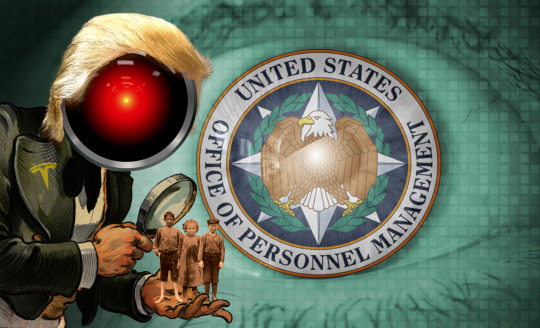
I'm on a 20+ city book tour for my new novel PICKS AND SHOVELS. Catch me in PITTSBURGH on May 15 at WHITE WHALE BOOKS, and in PDX on Jun 20 at BARNES AND NOBLE. More tour dates here.

In my 23 years at EFF, I've been privileged to get a front-row seat for some of the most important legal battles over tech and human rights in history. There've been tremendous victories and heartbreaking losses, but win or lose, I am forever reminded that I'm privileged to work with some of the smartest, most committed, savviest cyberlawyers in the world.
These days, it's more of a second-row seat – I work remotely, mostly on my own projects, and I rely on our Deeplinks blog as much as our internal message-boards to keep up with our cases. Yesterday, I happened on this fantastic explainer breaking down our most recent court victory, in our case against DOGE on behalf of federal workers whose privacy rights have been violated during DOGE's raid on the Office of Personnel Management's databases:
https://www.eff.org/deeplinks/2025/04/our-privacy-act-lawsuit-against-doge-and-opm-why-judge-let-it-move-forward
The post is by Adam Schwartz, EFF's Privacy Litigation Director. I've been campaigning on privacy for my entire adult life, but I still learn something – something big and important – every time I talk about the subject with Adam. His breakdown on EFF's latest court victory is no exception.
EFF was the first firm to bring a suit directly against DOGE, representing two federal workers' unions: the AFGE and the AALJ, and our co-counsel are from Lex Lumina LLP, State Democracy Defenders Fund, and The Chandra Law Firm. At the heart of our case are the millions of personnel records that DOGE agents were given access to by OPM Acting Director Charles Ezell.
The OPM is like the US government's HR department. It holds files on every federal employee and retiree, filled with sensitive, private data about that worker's finances, health, and personal life. The OPM also holds background check data on federal workers, including the deep background checks that federal workers must undergo to attain security clearances. Many of us – including me – first became familiar with the OPM in 2015, after its records were breached by hackers believed to be working for the Chinese military:
https://en.wikipedia.org/wiki/Office_of_Personnel_Management_data_breach
That breach was catastrophic. Chinese spies stole the sensitive data of tens of millions of Americans. The DOGE breach implicates even more Americans' private data, though, and while DOGE isn't a foreign intelligence agency, that cuts both ways. It's a good bet that a Chinese spy agency will not leak the records it stole, but with DOGE, it's another matter entirely. I wouldn't be surprised to find the OPM data sitting on a darknet server in a month or a year.
In his breakdown, Adam explains the ruling and what was at stake. We brought the case on behalf of all those federal workers under the 1974 Privacy Act, which was passed in the wake of Watergate and the revelations about COINTELPRO, scandals that rocked the nation's faith in federal institutions. The Privacy Act was supposed to restore trust in government, and to guard against future Nixonian enemies lists:
https://tile.loc.gov/storage-services/service/ll/llmlp/LH_privacy_act-1974/LH_privacy_act-1974.pdf
The Privacy Act's preamble asserts that the US government's creation of databases on Americans – including federal workers – "greatly magnified the harm to individual privacy." This is the basis for the Act's tight regulation on how government agencies use and handle databases containing dossiers on the lives of everyday Americans.
The US government tried to get the case tossed out by challenging our clients' "standing" to sue. Only people who have been harmed by someone else has the right ("standing") to sue over it. Does having your data leaked to DOGE constitute a real injury? Two recent Supreme Court cases say it does: Spokeo vs Robins and Transunion vs Ramirez both establish that "intangible" injuries (like a privacy breach) can be the basis for standing.
The court agreed that our clients had standing because the harms we alleged – DOGE's privacy breaches – are "concrete harms analogous to intrusion upon seclusion" ("intrusion upon seclusion" is one of the canonical privacy violations, set out in the Restatement of Torts, the American Law Institute's comprehensive guide to common law).
But the court went further, noting that DOGE's operation is accused of being "rushed and insecure," rejecting DOGE's argument that it only accessed OPM's "system" but not the data stored in that system. The court also said that it wouldn't matter if DOGE access the system, but not the data – that merely gaining access to the data violated our clients' privacy. Here, the judge is part of an emerging consensus, joining with four other federal judges who've ruled that when DOGE gains access to a system containing private data, that alone constitutes a privacy violation, even if DOGE doesn't look at or process the records in the system.
So in ruling for our clients, the judge found that the mere fact that DOGE could access their records was an injury that gave us standing to proceed – and also found that there were other injuries that would separately give us standing, including the possibility that DOGE's breach could expose our clients to "hacking, identity theft, and other activities that are substantially harmful."
The US government repeatedly argued that we weren't accusing them of disclosing our clients' records, every time they did this, the judge pointed to our actual filings, which plainly assert that DOGE agents were "viewing, possessing and using" our clients' records, and that this constitutes "disclosure" under the law, and according to OPM's own procedures.
The judge found that we were entitled to seek relief under the Administrative Procedures Act (APA), which proscribes the conduct of federal agencies – and that our relief could be both "declaratory" (meaning a court could rule that DOGE was breaking the law) and "injunctive" (meaning the court could order DOGE to knock it off).
Normally, a plaintiff can't ask for a judgment under the APA until an agency has taken a "final" action. The court found that because DOGE's actions were accused of being "illegal, rushed, and dangerous," and that this meant that we could seek relief under the APA. Further, that we could invoke the APA here because the remedies set out in the Privacy Act itself wouldn't be sufficient to help our clients in the face of DOGE's mass data-plundering.
Finally, the court ruled that our claims will allow us to pursue APA cases because OPM and DOGE were behaving in an "arbitrary and capricious" manner, and exceeding its legal authority.
All of this is still preliminary – we're not at the point yet where we're actually arguing the case. But standing is a huge deal. Ironically, it's when governments violate our rights on a mass scale that standing is hardest to prove. Our Jewel case, over NSA spying, foundered because the US government argued that we couldn't prove our clients had been swept up by NSA surveillance because the details of that surveillance were officially still secret, even though Snowden had disclosed their working a decade earlier, and our client Mark Klein (RIP) had come forward with documents on illegal mass NSA spying in 2006!:
https://www.eff.org/deeplinks/2022/06/effs-flagship-jewel-v-nsa-dragnet-spying-case-rejected-supreme-court
So this is a big deal. It means we're going to get to go to court and argue the actual merits of the case. Things are pretty terrible right now, but this is a bright light. It makes me proud to have spent most of my adult life working with EFF. If you want to get involved with EFF, check and see if there's an Electronic Frontier Alliance affinity group in your town:
https://efa.eff.org/allies

If you'd like an essay-formatted version of this post to read or share, here's a link to it on pluralistic.net, my surveillance-free, ad-free, tracker-free blog:
https://pluralistic.net/2025/04/09/cases-and-controversy/#brocolli-haired-brownshirts

Image: Cryteria (modified) https://commons.wikimedia.org/wiki/File:HAL9000.svg
CC BY 3.0 https://creativecomms.org/licenses/by/3.0/deed.en
--
EFF (modified) https://www.eff.org/files/banner_library/opm-eye-3b.jpg
CC BY 4.0 https://creativecommons.org/licenses/by/4.0/deed.en
326 notes
·
View notes
Text
It’s the first significant ruling in a growing legal push to pierce DOGE’s secretive veil, a decision that undercuts Musk’s repeated insistence about the operation’s transparency.
A federal judge ruled Monday that DOGE's "unusual secrecy" and immense power justified the urgent release of records under the Freedom of Information Act. | Anna Moneymaker/Getty Images
By Josh Gerstein and Kyle Cheney
03/10/2025 10:30 PM EDT
A federal judge has ruled that Elon Musk’s Department of Government Efficiency is wielding so much power that its records will likely have to be opened to the public under federal law.
U.S. District Judge Christopher Cooper said the vast and “unprecedented” authority of DOGE, formally known as the U.S. Digital Service, combined with its “unusual secrecy” warrant the urgent release of its internal documents under the Freedom of Information Act.
“The authority exercised by USDS across the federal government and the dramatic cuts it has apparently made with no congressional input appear to be unprecedented,” Cooper wrote in a 37-page opinion.
It’s the first significant ruling in a growing legal push to pierce DOGE’s secretive veil, a decision that undercuts Musk’s repeated insistence about the operation’s transparency — and the White House’s refrain that Musk is simply a run-of-the-mill presidential adviser with limited decision-making authority. Cooper said this representation is undercut by the weight of evidence that has trickled out in court and in the news.
The judge noted that DOGE’s speed and the fluidity of its leadership appear to be by design. He is ordering “rolling” productions of DOGE records to begin within weeks.
“The rapid pace of [DOGE’s] actions, in turn, requires the quick release of information about its structure and activities,” Cooper wrote. “That is especially so given the secrecy with which DOGE has operated.”
Cooper leaned heavily on news reports suggesting that Musk’s operation had led to the firing of tens of thousands of government employees, the dismantling of the U.S. Agency for International Development, a government-wide deferred resignation program and widespread access to sensitive government databases for relative outsiders.
316 notes
·
View notes
Note
i’m curious what your opinion is on the finer points of the case mentioned in the JSTOR post you reblogged earlier. the two sources in the post say that JSTOR didn’t press charges against him and had already settled with him by the time he killed himself. from what i read on wikipedia, the concern seems to be that JSTOR complied with a subpoena, which i don’t believe they have a choice to ignore? if anything it seems like the us government had reason to want him dead for wikileaks and public court records reasons, so they took a terms of use violation and blew it up into a dozen federal crimes.
is there more context i should be aware of? i have no particular affection or malice for JSTOR but the sources i found don’t exactly implicate the database or its employees in murder.
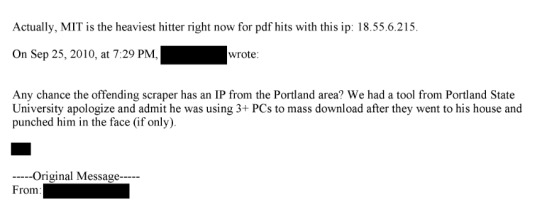


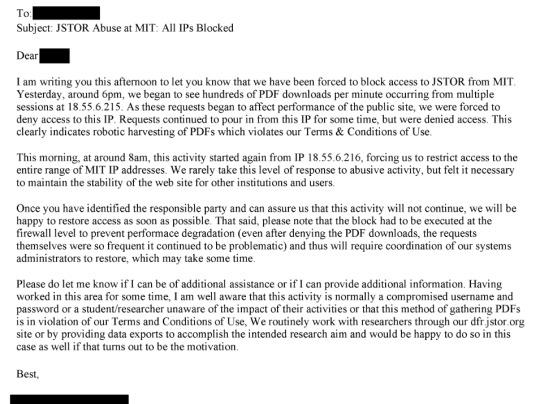
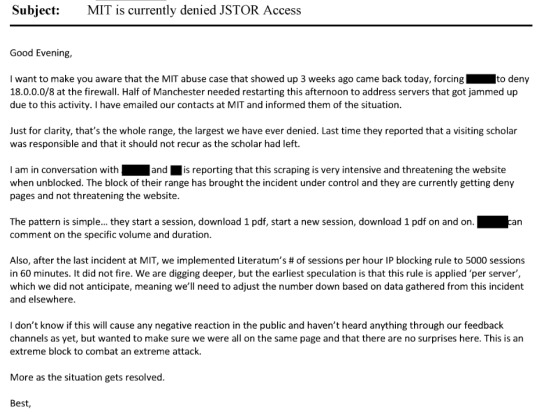
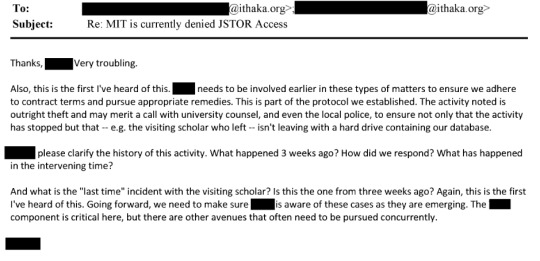
That's from page 175 of this document. This line: "The activity noted is outright theft and may merit a call with university counsel, and even the local police, to ensure not only that the activity has stopped but that - e.g. the visiting scholar who left - isn't leaving with a hard drive containing our database" is where I think the culpability starts.
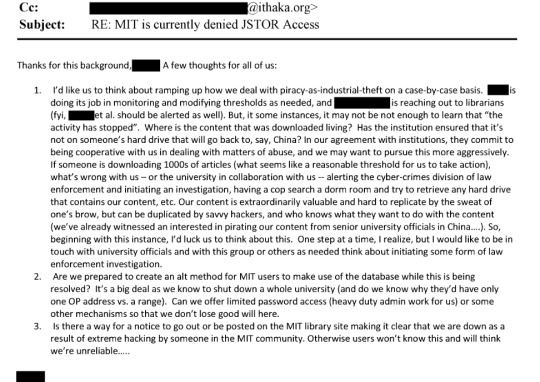
If someone is downloading 1000s of articles (what seems like reasonable threshold for us to take action), what's wrong with us - or the university in collaboration with us - alerting the cyber-crimes division of law enforcement and initiating an investigation, having cop search dorm room and try to retrieve any hard drive that contains our content, etc. Our content is extraordinarily valuable and hard to replicate by the sweat of one's brow, but can be duplicated by savvy hackers and who knows what they want to do with the content?
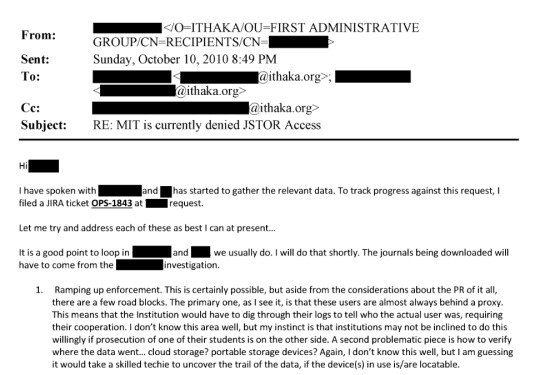
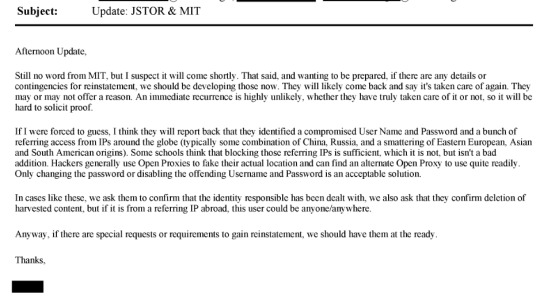
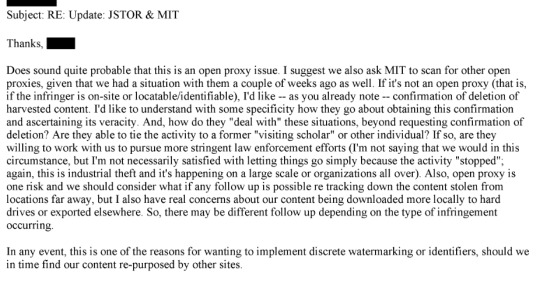
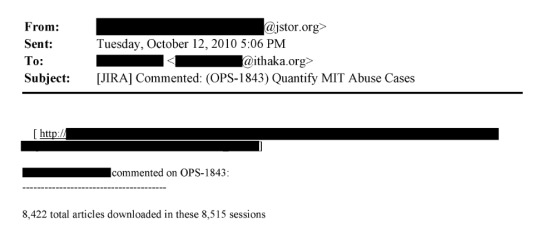
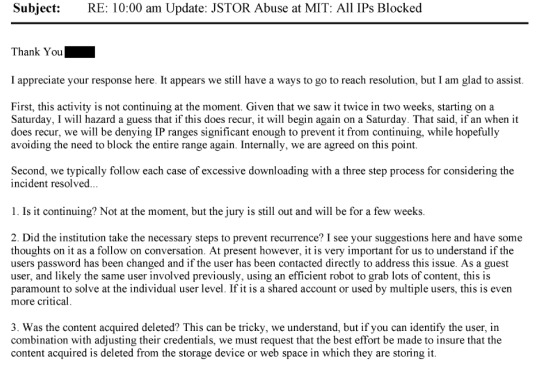
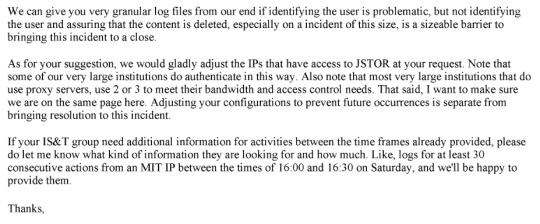
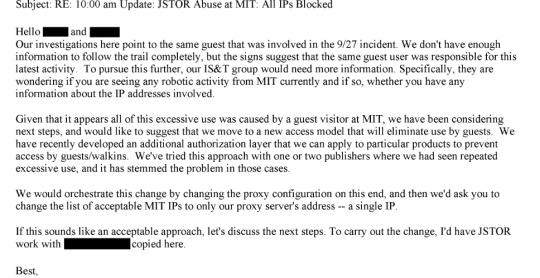
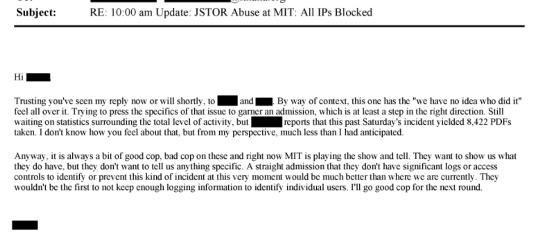
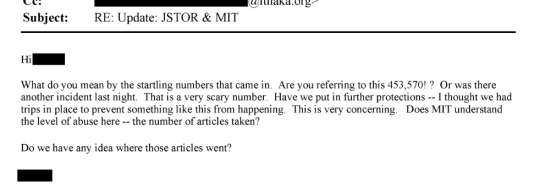

Page 379: "Does the university contact law enforcement? Would they be willing to do so in this instance?
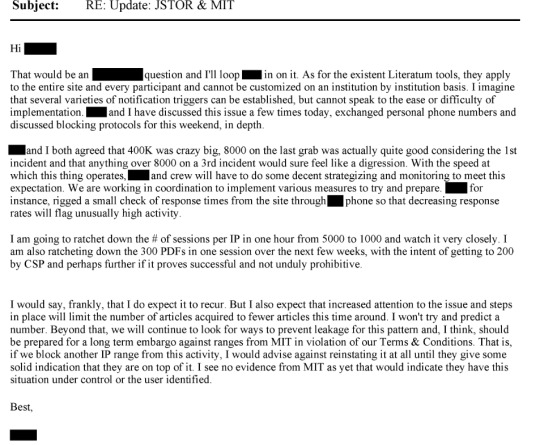

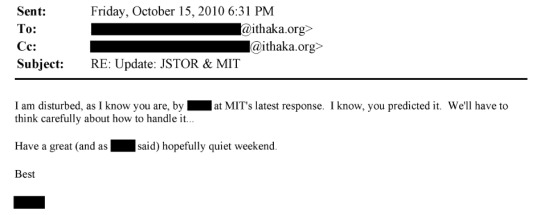
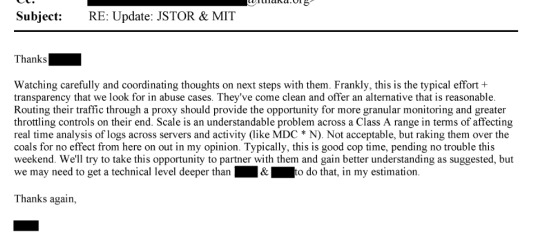
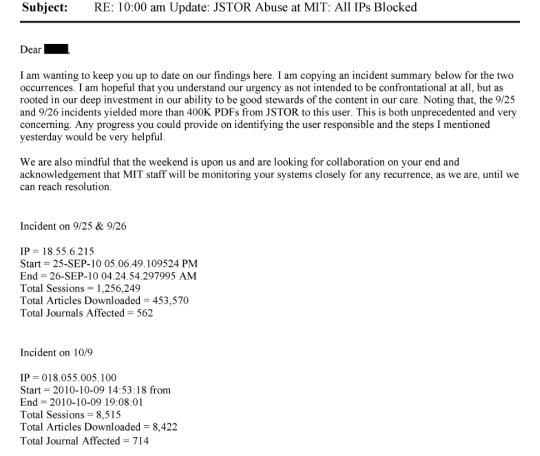
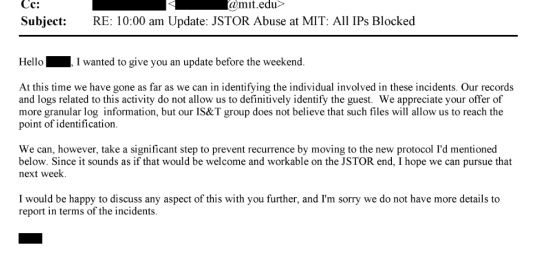
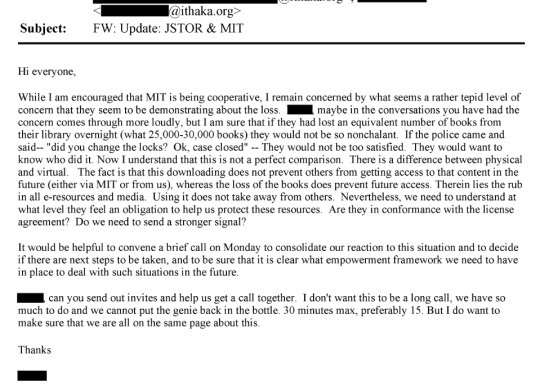
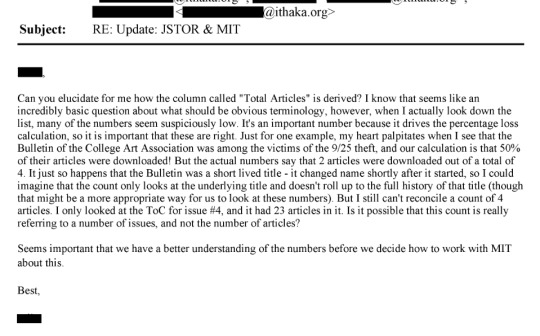
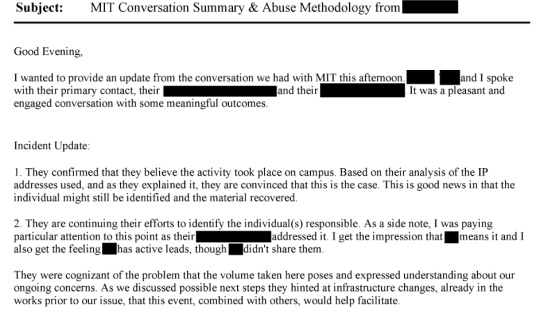
From page 1296:

I think the important thing to note here is that JSTOR had worked with MIT and had plans in place to prevent future similar downloads, but remained focused on identifying the person responsible for the downloads and ensuring that their data was deleted.

"I might just be irked because I am up dealing with this person on a Sunday night, but I am starting to feel like they need to get a hold of this situation right away or we need to offer to send them some help (read FBI).
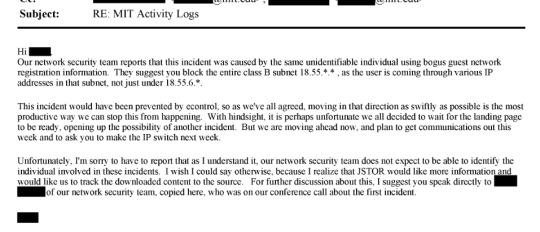
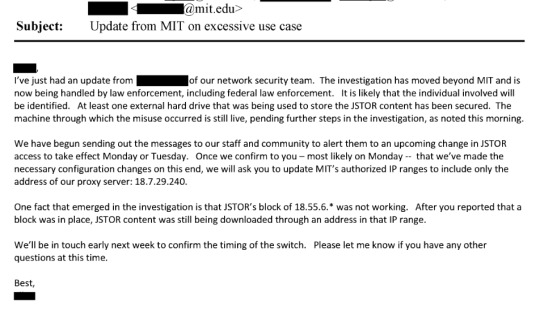
And there it is. Page 3093 of the document.
JSTOR can hem and haw about it all they want, but you can't un-call the cops.
MIT was working with JSTOR on preventing future incidents of pirating, but JSTOR repeatedly said that they weren't going to let it go, that it was unacceptable to drop the issue, that they were going to continue to pursue the pirate.
You can scroll through the document and see the JSTOR tech department and abuse team talking about Swartz as a script kiddie, and a hacker. You can see someone talking about how this was real theft - making the comparison to stealing books even while admitting that piracy doesn't close others out of access.
You can see the thread starts with a joke about punching someone in the face for hacking their system, and includes the tech team ominously considering whether they should threaten the MIT librarians with the FBI.
There's something really important to note here which I don't think that people who aren't PRETTY DEEP into hackery shit aren't aware of: US law enforcement is absolutely rabidly feral about prosecuting hackers. People may be more aware of this now because of Chelsea Manning and Edward Snowden (and perhaps a bit on tumblr because of maia arson crimew), but people who work in tech and who are in infosec - like the people joking about calling the FBI in these emails - would be aware of the bonkers disproportionate punishments faced by hackers. And knowing that, they kept pushing and pushing and pushing for identification of the hacker. They kept digging with MIT, they kept saying that simply preventing future incidents wasn't enough.
Early in the exchange someone from JSTOR asked "what's wrong with us - or the university in collaboration with us - alerting the cyber-crimes division of law enforcement and initiating an investigation, having cop search dorm room and try to retrieve any hard drive that contains our content, etc." and the answer is what happened to Aaron Swartz.
It is absolute bullshit for JSTOR to say "we arrived at a solution privately and didn't want to press charges" after law enforcement has gotten involved with a hacking case, especially one where they're talking about "real theft" and are attempting to quantify and emphasize the amount that was "stolen" from them.
The *public* may believe that private individuals or institutions are the ones who "press charges" but that's simply not the case. It's prosecutors who decide whether or not to go ahead with charges; they do it based on what cases they think they can win and what their office's perspective is on the crime. When you hear about people choosing to press charges it simply means that they decided to tell the prosecutor they wanted the case to go forward. It's up to the prosecutor whether or not that happens.
And the tech team at JSTOR had to know that law enforcement wasn't just going to wag a finger at an academic hacker.
There's a parallel here that happens sometimes when people have their identities stolen by their parents. If you mom takes out a credit card in your name, that's identity theft. That's fraud. That's illegal. If you reach the age of 25 and realize that your credit is ruined because your mom has been defaulting on cards in your name, you've got two choices to fix that: one is to accept the debt and pay it off and build up credit, and the other is to report the identity theft - which will end up with your mom in prison for a decade or so. Ruin your own personal finances, or your mom goes to jail for ruining your finances. So if you find out that your mom stole your identity you can't just call the cops to pressure her into transferring the debt to her name or something. That's not an option. The cops are not a threat to wave over people, they are not a way to get people to fall in line or act right. They aren't someone you can send to a college student's dorm room to retrieve a hard drive and have the matter drop.
When you call the cops on someone you are sending the full force of the law after them, and the full force of the law falls really heavily on hackers, and how heavy that blow can be is something that the JSTOR team must have been aware of when they were making snide comments about calling the FBI because they were frustrated with the noncommittal responses they were getting from librarians.
Ultimately it was the carceral state that killed Aaron Swartz, but they would not have been involved if JSTOR didn't think that what he did constituted theft.
Taking an *EVEN LARGER* step back from that, the idea that information can be owned and locked behind a paywall is what killed Aaron Swartz, someone who fought for information to be free.
Like. JSTOR is a licensing company. At the end of the day, cute social media posts and all, they're the same as the RIAA and ASCAB. They exist to extract a fee from people attempting to access information.
Aaron Swartz and all that he stood for are an existential threat to their core function.
Are JSTOR's hands as dirty as the federal prosecutors? Absolutely not. But they operate on a model that puts them in opposition to open information activists and it ended up with a hammer falling on Aaron Swartz that they dropped.
2K notes
·
View notes
Note
I am sorry but I'm going to need a Ransom story with this prompt. It can be RoaR or a one-off, he can love it or hate it in this space, he can see it over Reader's shoulder on the computer screen, your choice!

o.0 oh boi oh boi oh boi! Fall Vibes but it's gonna be my summer challenge submission to @the-slumberparty's Sundae Bar, featuring the flavors Cookies and Cream (soulmates) and Rocky Road (rags to riches) with the topping Oreos (marriage of convenience (reluctantly)). Also my second entry for @stargazingfangirl18's Birthday Bonenanza, featuring a babe in love and cranky about it + "can you just...hold me please?"
For Show Ransom Drysdale x poor!soulmate!reader
Summary: Ransom hates that you--his soulmate and wife--are nothing like him.
Warnings for smut and Ran's a**hole brain (rude, nasty thoughts that he barely even believes). Classic Lexi--this is cheeky, y'all, but you know it's because I can't help myself... MINORS DNI. Find all-age friendly fic on my Light Masterlist. WC 2.1k

Ran didn’t believe in love to start, but this is fucking ridiculous. Opposites attract? Get wrecked, asshole. He’s keeping opposites on the other side of the house. It’s not far enough.
It’s standard practice for the confirmation of matching soulmarks to act as a de facto marriage contract—common law, if you like,—and Ransom Drysdale fought tooth and nail to make you prove you had his name on you. He needed to see it with his own eyes or fuck that shit.
His is obvious; he can show it off. In fact, Ran is surprised by how long it took you to come forward, considering his family and status, considering his lifestyle of being very visible.
But no, he had to wait for a fucking database to pop out record of his match from your healthcare provider, and he had wait for that because the government knew about your health…because they know such things…about people who need their fucking money. The registration of soulmarks puts the financial responsibility on the soulmate if they end up having the means.
Now Ran is responsible for you, a woman he made lower the front of her panties in open court to reveal his goddamn name in his own goddamn handwriting imprinted right above her goddamn cunt, and suddenly it became his cunt, his problem, his responsibility.
You’re not even fun. You had no money and didn’t care to have any, so you moved your few, ratty belongings into his home, replacing nothing, offering nothing in return for his—well, in return for every fucking thing he has now being yours, too. It’s so fucked.
You don’t want to show off, and he has no intention of showing you off. He can’t be seen with you, not without the proper clothes or jewelry, and you refused to get them. Instead, Ransom leaves you alone in the house, doing whatever he wants, whenever he wants, as always. He won’t talk to you because he just gets furious every time. He’s not going to have deep conversations about the state of the world, though he might have one social justice issue he can fight for: the mother-fucking law that made you his wife without question.
Ran slams the kitchen cabinet storing all-white, matching stoneware mugs when he notices what’s missing: your single, sad, flea market mug. It’s clay so it always looks dirty, and he hates it.
He lightly punches his own neck in irritation.
He didn’t stand a chance fighting the marriage, not with your name in deep, port red letters creeping up his throat, higher than any turtleneck he’s ever owned. Coupled with his legal name resting snuggly beneath your pubes, it was obviously, technically accurate that you’re soulmates. When was the last time someone challenged that system, he thinks. That might be a better use of his money than—
Where are you anyway?
For all his annoyance, he hasn’t set eyes on you for days.
His house is large enough (and he spends so much time anywhere else) that you have your own room, which you didn’t question, and the kitchen is easy enough to share when one of you eats out with other people (as he does two to three times a day). You get the slightly bigger and more formal living room while Ran gets the den with the big TV. Really it’s been the perfect system for almost forgetting you exist.
He pours tea into his clean, white mug and leaves said big TV fairly loud on some program he wasn’t paying attention to, leaning over the granite countertop to see if he can spot you from this angle.
No luck.
He steps closer, sipping.
A little closer, more sipping, a purposeful smack of his lips to grab your attention if you are just around the corner.
There are two openings, both far larger than doorways, to the living room, each through the central hall. When he doesn’t immediately see you, he steps to the farther opening. What the—
What’d you do to his couch?
Is that every single pillow and blanket from your side of the house?
Did Yankee Candle Company throw up in here?
What, the fucking fireplace wasn’t enough ambiance for you? You had to make some sort of nest with his stuff? And there’s that ugly-ass mug, no coaster, on his super-expensive, reclaimed hardwood coffee table.
A pillow shifts.
No, not a pillow; it’s your back, and when you shift again, Ran sees one of the plush throw blankets slink farther down your bare skin. It’s the largest swath of your body he’s ever seen.
You lay with your arms folded, peering out the windows behind the couch, and you still haven’t fucking noticed him.
He huffs before realizing he isn’t listening to the faint TV anymore, but when he ticks his head, he sees your TV isn’t on either.
“”I think of nothing but you as I fall asleep at night”—” Ran hears a woman’s voice fake a deeper tone before switching to normal “—Javier says, pulling her soft curves into his hard body—”
You sigh dreamily and wiggle on the cushions. The blanket slides over the swell of your ass.
Ran stops moving mid-sip of tea.
“”Please, my darling, let me have you—“ this is fucking terrible, he thinks “—as only a lover can.””
Alright, now Ransom is just sad. You’re naked in his living room, rubbing your thighs together and listening to an erotic novel on your phone.
“Chloe felt his digits dance across her clavicle, his eyes enchanted by her heaving bosom…”
Go out to a club or restaurant with him? No. Wear nice clothes he could buy you? Nope.
“”Javi,” she gasps, distracted by his rough palm groping her breast hungrily, “I can’t believe you want me.””
Ran is going to fucking gag at the whining appall in the narrator’s voice.
Why listen to this awful shit instead of show off him as your husband? From the quick shiver racing down your spine and the curl of your toes where they hang over the cushion’s edge, it’s because you’re fucking horny for it.
Good god, how low are your standards?
He stalks forward, feet hitting the floor hard until he reaches the plush rug.
Startled, you peer over your shoulder at him, eyes wide like a deer in the headlights, and you begin scrambling to recover yourself.
Ran puts his cup down by yours. “Don’t move,” he orders, and to his surprise, you obey, keeping you head turned his direction and sinking back into the pillows.
“”How could you doubt? From the moment I met you, I adored you.””
He swivels to face the same direction as you, reaches out his hand and mime the stroke he’s contemplating tracing over your curves.
“”I’m yours,” Chloe breathes, Javier’s growing member signaling his desire against her silk-covered core.”
Ran finally bends until the tip of his middle finger grazes the inside of your thigh.
As he drags it over one cheek and down the other, you whine and push your ass toward his hand.
That’s…not bad, all things considered. You are his wife, after all, and you clearly want to be fucked. He won’t argue that having some other woman’s name scrawled on him hasn’t limited his game for quite a while. Financially independent or not, when a pussy is presented to him, Ransom will say ‘yes.’
He stops noticing the audio from your phone and just dives in, no sentiments or kind words of his own. He simply unbuckles his belt, pops the button of this jeans, and rips that zipper down before teasing your folds to find enough slick at your entrance to swirl around. He spreads you and your wetness with purpose. Each second that passes drives Ransom a little bit more insane.
Impatient, strung out like a virgin on prom night, he rushes to shove his pants out of the way and kicks one knee up between your legs, his other foot still on the floor. He pumps his fingers inside you until he’s knuckle-deep and nearly dripping, manhandling your hips to the right height to sink his tip into you.
Ran groans at how fucking good you feel. He’s probably just desperate. He’d be excited about any ol’ means to come right now.
He snaps his hips in small thrusts until his whole length glides in and out in seamless stimulation. You’ve buried your face in the pillow, so he can’t hear if you make any noise. He can, however, see your hands scratch at the upholstery and clench into fists. He can see you deepen the arch of your back, angling his dick to fuck just slightly down through your channel. The pressure squeezes the spongy head of his cock like a vice. He’ll never say it out loud, but your pussy is fucking perfect. God fucking dammit.
Ransom relentlessly drives into you, catching the sideview of your breasts bouncing each time his thighs slap yours. He smacks your ass once just to see if it jiggles for him, and that’s when your hand snakes to disappear between your legs. He expects you’re going for your clit which is good because he’s about to get off and get lost, but instead, he feels your soft fingers cup his balls.
He’s so enamored by the sensation that he switches to tiny pulses deep in your cunt while your hand wraps and rolls his sac gently. Twitching and tensing, Ran unabashedly moans until your walls constrict around his length.
He’s got to make you do that again.
Ransom collapses forward to lean over you, his own hand diving to find your clit, resting his palm right over your mound and soulmark. Every inch of his body burns hot with need. He humps wildly, resting his chin over your shoulder.
“”I don’t care how, Javi, just stick it in there. I need you. I need you so badly…””
“Jesus Christ,” Ran growls, “are they still not fucking?”
A giggle bursts from your lips, a sweet, happy sound he’s never heard from you before, and you reach for him. Your palm lands on his soulmark, your fingers curling to scratch the hairs at the nape of his neck, and there’s…there’s…
He can’t comprehend how your body fits his so well. He can’t reconcile this sudden swell of obsession in his gut for you. He’s enveloped in a binary system of souls, gravity tugging at that connection between you.
Ran doesn’t believe in love or destiny. He refuses. He believes in pleasure and perception, in accumulation and ownership.
The only thought left in his static-filled head is mine, mine, mine, mine.
He falls over the edge first, a satisfied shout punctuating each spurt he plants within you, furiously working your messy clit and kneading one breast in his free hand until he feels that squeeze again, and again, and again, dying to a flutter just as your shared cum leaks out around his cock.
By this time, Ran is panting and resting a sizable portion of his weight on you, knees knocked loose in his onslaught, pushing you both flat to the chaise cushion, feet dangling off the end.
You still hold each other’s mark in a comforting palm.
He’s speechless as the room fills with heated love declarations amidst passionate sex and bad dialogue. Ran tries to catch his fucking breath. He’s glad you don’t speak either.
Everything about his life—his past, his present, his future—sits utterly raw in front of him, and he can’t cope.
He makes the mistake of peeling his body off yours, releasing you and dislodging your hand. The cold emptiness which immediately sweeps over him is sickening, and Ran barely waits for you to roll onto your back before he wedges himself between your legs again, instinctually laying on his side, pressing his sweater-clad shoulder against your sopping folds just so he can rest his soulmark right on top of yours.
Euphoria returns to his body and mind, thick like honey and all-consuming.
He doesn’t want to admit it. He doesn’t want to talk about. He doesn’t want to live a moment without you.
Mine. Mine. Mine. Mine.
Mercifully, the audio speaks for him.
“”Can you just…hold me please? That was…that was…””
“”So intense,” Javier rumbles, “so beautiful.””
Ransom, the preening trust fund baby, has finally found something all his own, something he doesn’t want to share, something shown only for him.
He refuses, however, to call it ‘love’…
…yet.

[Main Masterlist; Ko-Fi]
A/N: I'm fine.

#ro answers#sundae bar#navy and roo's sleepover#sleepover challenge#summer challenge#happy birthday siri 2024#ransom drysdale x reader#ransom drysdale fanfiction#ransom drysdale smut#ransom drysdale x female reader#ransom drysdale x you#ransom drysdale fic#soulmate au
320 notes
·
View notes
Text

"In their statement on Friday, NPD warned that the “the information that was suspected of being breached contained name, email address, phone number, social security number, and mailing address(es).” It recommended the public to take a number of steps to safeguard their identities, including freezing their credit and putting fraud alerts on their files at big credit bureaus.
The breach came to public awareness after a class-action lawsuit was filed August 1 in U.S. District Court in Florida, which was first reported by Bloomberg Law.
National Public Data did not share how many people were at risk, but hackers, who have been identified as part of the hacking group USDoD, have been offering, for sale, what they claimed were billions of NPD records since April, though the Washington Post reported that “security researchers who looked at the trove said some of the claims were exaggerated.”"
source 1
source 2
source 3
free database created by Pentester to see if your information has been leaked
#destiel meme news#destiel meme#news#united states#us news#cybersecurity#data breach#hacking#tech industry#cyber security#identity theft#social security#national public data
226 notes
·
View notes
Text
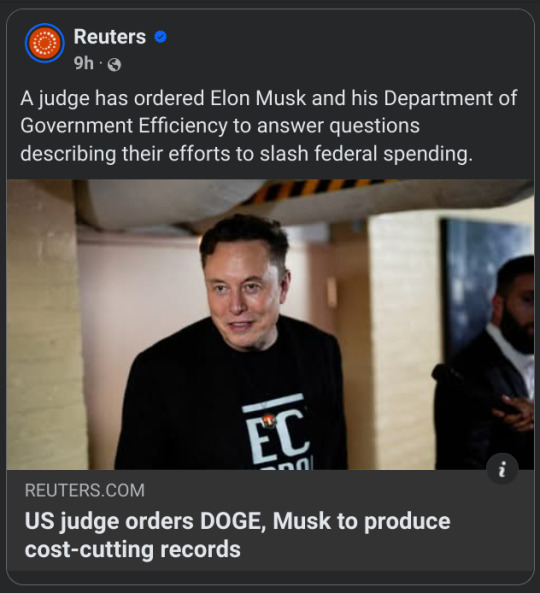
March 13 (Reuters) - A U.S. judge has ordered Elon Musk and his Department of Government Efficiency to turn over a variety of records and answer questions describing their efforts to slash federal spending. Wednesday night's decision by U.S. District Judge Tanya Chutkan in Washington, D.C., came in a lawsuit by 14 Democratic state attorneys general against Musk, DOGE and Republican President Donald Trump.
The states argued that Musk violated the Constitution by wielding power that only officials confirmed by the U.S. Senate can exercise under the Appointments Clause, and sought materials from him through a process known as discovery.
Chutkan, an appointee of Democratic President Barack Obama, said her order focused mainly on who at DOGE was making cost-cutting decisions and how far they could go.
"Defendants argue that the 'inner workings of government' are immaterial to an Appointments Clause claim," she wrote. "The court is not convinced, but that is a legal issue appropriate for resolution after fulsome briefing.
"At this stage," she added, "it is sufficient that plaintiffs' discovery requests intend to reveal the scope of DOGE's and Musk's authority."
The U.S. Department of Justice, which represents the defendants, did not immediately respond on Thursday to a request for comment.
Chutkan limited discovery requests to material concerning agencies, employees, contracts, grants, federal funding, legal agreements, databases and data management systems that involve or engage with the 14 states as well as entities they operate or fund.
She rejected the states' request to obtain sworn testimony through depositions, and said her order does not apply to Trump.
Republican and Democratic administrations have long resisted efforts to force top White House advisers to provide court testimony or information they consider privileged.
Musk and DOGE have until April 2 to comply with Chutkan's order.
The lawsuit sought to bar DOGE from accessing information systems at several government departments and firing federal employees or putting them on leave.
56 notes
·
View notes
Text
Back in November, Elon Musk professed his abiding belief in open government. “There should be no need for FOIA requests. All government data should be default public for maximum transparency,” he tweeted.
“We post our actions to the DOGE handle on X and to the DOGE website,” he boasted in the Oval Office last month as his young child wandered randomly around the room full of reporters. “I don’t know of a case where an organization has been more transparent than the DOGE organization.”
That was a lie.
At that time, the DOGE website had virtually no information on it. And DOGE’s public pronouncements are often either mathematically impossible, or, like the $50 million “condoms for Gaza” claim, simply false. In fact, DOGE staffers have taken great pains to obscure their identities, with Musk calling it a crime to dox them. The agency even spent a month refusing to say in court or anywhere else who the DOGE administrator was.
As a practical matter, this makes it impossible for the public to see what DOGE is doing. From a legal standpoint, it allows the administration to take a strategically ambiguous stance in hopes of shielding DOGE from judicial interference.
But the jello against the wall strategy has largely failed in court, and Monday a federal judge ordered DOGE to pony up and begin complying with a Freedom of Information Act (FOIA) request filed by Citizens for Responsibility and Ethics in Washington (CREW).
An agency by any other name …
While Elon Musk was preaching the gospel of transparency, the Trump administration was taking deliberate steps to hide what DOGE was doing. Specifically, Trump signed an executive order inserting DOGE into the skin of an existing agency, the United States Digital Service, and then redesignating it as part of the Executive Office of the President (EOP).
The order specified that DOGE is not a federal agency, a legal distinction which turns out to be critical in at least three pending lawsuits. Because if DOGE is not an agency, then it doesn’t have to comply with federal records laws or have its leader confirmed by the Senate. But only an agency can claim authority to shut down great swathes of the federal bureaucracy — something Musk brags about doing on the daily. And so the Justice Department has tried to situate itself in the cut, arguing that DOGE is simply an “instrumentality” of the president.
In a case called AFL v. Department of Labor, a consortium of labor unions sued to block DOGE personnel from rifling through sensitive personal and financial information on the DOL’s servers. They argued that, if DOGE is not itself an agency, then it can neither park employees at agencies under the Economy Act of 1932 nor access sensitive government records under the Privacy Act of 1974.
Judge John Bates denied the unions’ request to lock DOGE out of the database, ruling that entity was pretty clearly an agency since it’s engaged in a wholesale reshaping of the federal government.
“[P]laintiffs have not shown a substantial likelihood that USDS is not an agency,” he wrote, adding that “it follows that plaintiffs have not shown a substantial likelihood on the merits of their Privacy Act claim, for without the argument that USDS employees may not be detailed under the Economy Act, the Privacy Act claim all but disappears.”
But he called out the government for its “desire to escape the obligations that accompany agencyhood — subjection to FOIA, the Privacy Act, the APA [Administrative Procedures Act], and the like — while reaping only its benefits.”
“And so USDS becomes, on defendants’ view, a Goldilocks entity: not an agency when it is burdensome but an agency when it is convenient,” the judge observed drily.
Judge Bates’s colleague Judge Tanya Chutkan came to much the same conclusion in a case called New Mexico v. Musk. There a coalition of states argued that DOGE is a federal agency, and thus Trump needed to nominate Musk as its director and submit him for Senate confirmation under the Constitution’s Appointments Clause.
The judge denied the states’ motion for a temporary restraining order barring DOGE from wreaking havoc on the federal government, finding that the states had failed to demonstrate the requisite danger of imminent, irreparable harm to justify a TRO. But she made it clear that she agreed that DOGE is definitionally an agency.
Plaintiffs raise a colorable Appointments Clause claim with serious implications. Musk has not been nominated by the President nor confirmed by the U.S. Senate, as constitutionally required for officers who exercise “significant authority pursuant to the laws of the United States.”
On the face of it, both sets of plaintiffs lost, but the failure to secure emergency relief shouldn’t obscure the importance of the courts’ rulings. Because if DOGE is a federal agency, it’s subject to FOIA, the Privacy Act, and the APA — which is exactly why President Trump tried to preemptively declare it a non-agency by fiat.
… would still be subject to FOIA.
As Judge Bates pointed out, designating DOGE as part of the EOP was an obvious attempt to exempt it from multiple federal laws. Indeed, spokesperson Katie Miller acknowledged as much on Twitter when 404 Media reported that DOGE was getting off Slack to evade FOIA.
“Per the Executive Order [DOGE] was reorganized under the Executive Office of the President and subject to Presidential Records,” she wrote.
Under the Federal Records Act (FRA), documents generated by federal agencies are presumptively public and subject to FOIA. But under the Presidential Records Act (PRA), presidential records are not subject to FOIA, and the president can functionally lock up them up for five years after he leaves office. Worse still, if the president refuses to comply with the PRA and destroys documents, as Trump did routinely, there’s essentially no remedy.
Not every document created in the EOP is a presidential record immune from FOIA. The DC Circuit ruled that the Office of Science and Technology and the Council on Environmental Quality, both of which are part of the EOP, are subject to FOIA because they exercise substantial independent authority. But the administration takes the position, at least as a legal matter, that Musk and his minions are simply “advising” President Trump, and lack any authority of their own.
It’s a preposterous stance in light of multiple executive orders giving DOGE hiring and firing authority, as well as access to databases at every government agency. But when CREW filed FOIA requests for DOGE documents, they got no response. And so on February 20, the nonprofit sued and filed a motion for preliminary injunction forcing the government to cough up the data by March 10 so that Congress could be informed of DOGE’s activity before passing a budget.
The DOJ tried mightily to duck the agency issue, leaning instead into CREW’s demand for expedited processing and complaining in their opposition memorandum that “the primary effect of granting a preliminary injunction would be to disadvantage other requesters who would be pushed further back in the FOIA processing queue.”
But at the hearing, the government admitted it was refusing to complete the FOIA request on any timeline because it believes that DOGE is not an “agency” susceptible to FOIA. And like Judge Bates and Judge Chutkan, Judge Christopher Cooper wasn’t buying it.
The judge pointed to DOGE’s “substantial authority independent of the President” as laid out in the executive order and later confirmed in public statements by both Musk and Trump.
And the judge noted that DOGE is actually exercising that independent authority: After Musk tweeted that he’d spent the weekend “feeding USAID to the wood chipper,” the agency was functionally shut down.
“For all these reasons, the Court concludes that USDS likely qualifies as an agency for the purposes of FOIA,” he wrote.
Judge Cooper also tweaked the government for playing games with regard to DOGE’s status.
“The Court finds it meaningful that in its briefing and at oral argument, USDS has not contested any of the factual allegations suggesting its substantial independent authority,” he wrote, referring back to Judge Bates’s “Goldilocks” comment. And while Judge Cooper wasn’t willing to enforce the March 10 deadline, he did order expedited processing, with rolling production to begin immediately.
FOIA requests often take years, but, as the court notes, DOGE is used to moving fast when it comes to burning down the government.
“In the less than two months since President Trump’s inauguration, USDS has reportedly caused 3% of the federal civilian workforce to resign, shuttered an entire agency, cut billions of dollars from the federal budget, canceled hundreds of government contracts, terminated thousands of federal employees, and obtained access to vast troves of sensitive personal and financial data,” Judge Cooper wrote, adding that, “given that [DOGE] is apparently not processing any other requests, the Court doubts it would impose much of a burden on the department to expediently process CREW’s request.”
He ended by ordering DOGE to preserve all documents, in light of multiple media reports that DOGE employees are communicating via Signal and non-government emails.
The ruling is a total loss for the Trump administration, which will doubtless appeal in hopes of continuing to hide what Musk is doing. But, barring intervention by a higher court, we’ll soon see the results of CREW’s pared-down query:
The narrowed USDS request seeks, in each case from January 20, 2025, to the present: “all memoranda, directives, or policies regarding changes to the operations of USDS”; organizational charts for USDS; ethics pledges, waivers and financial disclosures of USDS personnel; “all communications with the office of the Administrator of the USDS regarding actual or potential changes to USDS operations”; and “all communications between USDS personnel and personnel of any federal agency outside of the Executive Office of the President regarding that agency’s staffing levels (including any effort to reduce staffing), treatment of probationary employees, contract and grant administration, access to agency information technology systems, or the authority of USDS in relation to that agency.”
And perhaps more importantly, the unanimous rulings that DOGE is an agency may provide a handle for outside litigants and Congress to grab hold of it before it succeeds in decimating the entire federal government. Let the FOIA and APA cases begin!
55 notes
·
View notes
Text
Show Pin Lee as a Lawyer
I've seen some criticism of how Pin Lee is depicted in the show because she/they is not being portrayed as a badass lawyer like she/they is in the books. (she in books/they in show).
I do not understand this criticism, as there is nothing in the situation that can be addressed with lawyering or legal skills at this time.
What is Pin Lee supposed to do as a lawyer?
We know there is no faster-than-light communication. The only way to contact anyone is to send an emergency beacon through the wormhole, which will prompt the company to send a retrieval. There is no way to send mail or e-file anything.
There is a LOT Pin Lee can do once they're off the planet.
Identify and sue the third party, both PresAux and DeltFall have a LOT of claims (if they want to make extra money they could offer to represent DeltFall as well provided there are no concflcts or they waive any conflicts, I don't see any conflicts, depending how many parties were at DeltFall and what a Class is in this world, you might have grounds for a class action)
Sue the company for contributory negligence if it was their fault; it was so easy for a third party to sabotage the company's systems and data
Sue the company for hiding the third party's existence.
Potentially sue the company for failing to discover the alien remnant things since the company mapped this planet, and sold rights, and it's illegal to exploit Alien Remnants, so that should have been disclosed, or possibly the whole thing taken off the market for survey,s depending on if the whole planet is now quarantined/worthless.
Obtain legal ownership of Sec Unit
(Mensah said Murderbot would be free to do what it wants, the easiest way to do that would to legally buy it as opposed to stealing it, so does the rental contract allow them to buy their SecUnit? If not would the Company be willing to sell the SecUnit as part of a potential settlement with the Company for the above speculative claims.
Furthermore, since they have grounds to sue the Company, they can likely can get a court order to get all the data SecUnit has since they will need that for the lawsuits against third party and company (legal action to preserve records, so that it is not wiped).)
There is a lot Pin Lee can do once they can sue about it/send demand letters/notices, etc.
All of this is speculative based on a hypothetical legal system with hypothetical laws, theories, duties, and procedural avenues, which we know nothing about. I can't say what exact claims exist because we don't have enough information.
However, what we can assume is that taking any legal action is not something you can do currently while on a remote planet with no means of outside communication.
Lawyers are like Combat Units, hired guns, but a lawyers weapon is the pen, legal practice is writing. On a planet where you cannot contact anyone there is not legal recourse until you get back from that planet. (They can access any legal databases stored on the Company's satellites and begin drafting things - I guess, though I don't think that would be entertaining to watch - also they don't even know all the facts yet).
(( Disclaimer: This is not legal advice; I'm a lawyer, not your lawyer))
48 notes
·
View notes
Note
Fandom: Invader Zim
Character: Tak
Pairing: Romantic
Type of Fic: Concept
(Optional) Other info I should know: Gender-neutral human reader
Sure! Hope you like it :) I rewatched her episode for this.
Yandere! Tak with Human! Darling
Pairing: Romantic
Possible Trigger Warnings: Gender-Neutral Darling, Obsession, Manipulation, Stalking, Jealousy, Kidnapping, Isolation, Secret recordings, Dehumanization, Mind control/Mind tricks, Implied murder, Forced "relationship."

Cunning, ruthless, and deeply vindictive... It's easy to see Tak as more serious than Zim.
She's much more advanced in her tech and one can assume she'd be capable as an invader.
If Zim didn't ruin it for her.
Her being with a human would be strange for her.
After all, she doesn't understand human affection or behavior.
She didn't think she cared, either.
Not until she met you, someone close with either Dib or Zim.
Originally her goal for interacting with you was information.
Her disguise is convincing compared to Zim's, mostly because hers was proper.
She doesn't understand humans but you seem to fascinate the Irken.
Not going to lie... Tak is infinitely more capable of securing her obsession than Zim.
She can easily stalk and remember your routines with MiMi.
MiMi is Tak's SIR Unit, but when disguised the bot just seems like a cat.
So while you think Tak's just a cat person and her cat seems really interested in you...
She's actually spying on you.
Of course, at first it's to know more info about Zim.
You're either close with the male Irken or his nemesis, Dib.
Which means you must have info.
Instead, she has a ton of footage of your routines and who you talk to through MiMi.
Along with a lot of footage that includes you petting MiMi, which wasn't what she was looking for at all.
Tak herself is your classmate in school.
For the sake of this concept of course, this is an AU where you're a senior in high school or you're in college.
She ends up following you to every class, keeping a cautious eye on you.
Tak's known to many as just, y'know, the goth girl.
Her human disguise has that appearance and many find her strange.
Some may even see her as appealing.
Tak is only interested in one human.
You.
She isn't even sure why.
Humans are just the disgusting life forms on this planet.
Why does she find this one interesting?
She shows to be distant around at times, other times she tries to engage in conversation.
Although her speech with you seems... off... a bit too eager.
She wouldn't harm you.
No, she doesn't think humans show affection through violence.
The only reason she's violent with Zim is because she hates him.
She probably knows how humans show affection.
Does she understand the purpose? Not entirely.
Doesn't matter much to her.
She tries to deny the idea of liking you.
However... When in her ship, she finds herself scrolling through the footage MiMi took of you.
She will admit... you're cute... for a human.
Due to Irken not having courting or romantic practices like humans, her views of you are twisted.
She probably thinks having a partner is like having a pet... or entertainment.
She's seen human courting before... the internet database she hacks into helps with that
But she struggles understanding the real meaning behind it, even if she imagines doing it with you.
It's quite literally alien to her.
That might not stop her from replicating it, though.
Tak may mimic human courting to try and be closer to you.
Just to satisfy her strange curiosity.
You'll see this when she gives you gifts she's heard you wanted.
Of course... She stole it with MiMi, but it's the thought that counts, right?
She even tries replicating physical touch, like hugs or a hand around the waist.
Feels weird but... She's trying.
In terms of kissing? She'd probably stay away from that for the most part.
Although, when she feels she's had enough of 'taking things slow'... She's just going to abduct you.
Similar to Zim, she plans to keep you in a cell with MiMi watching your every move.
She may even make you walk in there yourself as she's shown to have some sort of mind trick powers.
Said powers are actually how she gets you gifts, food, and others to not question your disappearance.
Why should they worry?
They no longer need to do that.
Such manipulation is how she gets her way without too much violence, which could draw attention.
People like Dib and Zim could notice.
But she'll probably find other ways to keep them out of her way.
Examples include an injury of some kind... or even death (Especially for Zim).
Tak plans everything, so others finding out about you will be easy for her to cover up for the most part.
You're scared enough when Tak, whom you thought was your friend, kidnapped you.
Yet you're even more scared when she reveals herself as her Irken form, an alien smaller than you yet still quite capable of harm.
She'd probably stay her Irken form around you in private, not caring much about you seeing her now.
Scared? Understandable.
But if she went through all this trouble of 'courting' and caging you... Then it must mean she cares, right?
You doubt that.
She'd probably do things like pet you or hold you close to him.
She may even praise you, dehumanizing you into a pet.
She sort of sees the appeal now.
She likes having control over you, a human.
Your species is lesser to her...
You should feel grateful she's 'pampering' you.
It irritates her when you sit in the corner and sob that wretched salty water.
Do you need more affection?
More pets? Hugs? That kiss thing humans do?
She doesn't particularly enjoy it... but it is a bit endearing to see how you react.
Tak blames you for catching her attention.
Yet... You'll prove useful.
Her first step is going along with her current plan.
She'll get rid of Zim... and Dib for that matter.
Then she'll claim the Earth as her own to impress The Tallest.
After that?
Well... After that you're coming home with her.
She thinks she's courted her human correctly.
After all, now you're hers!
You'll live in the cell she made for you and stockpile supplies...
Then you'll go to your new home with her...
Her beloved human pet... or is it a partner in your culture? She still doesn't quite understand.
57 notes
·
View notes
Text
#u.s. universities#immigration#international students#education#student visa#u.s. department of homeland security#us immigration and customs enforcement#students' database records erased
21 notes
·
View notes
Text
Matt Shuham at HuffPost:
When she was working as an election official in Arizona years ago, Tammy Patrick encountered voters who supported what was then the state’s new “proof of citizenship” law for voter registration — only to realize that they had been disenfranchised by it. “They’d say, ‘I voted for that!’” she recalled of the voters, many of whom were “snowbirds, older people, who didn’t have the wherewithal to get [the correct documents] because the documents didn’t exist anymore.” “It was heart-wrenching,” Patrick said.
At the time, Arizona was the only state in the nation with a documentary proof of citizenship requirement for voters, and thousands of people have since lost out on the right to vote in state elections. Kansas, which later also tried its own citizenship requirement for voter registration, saw similar results. “Kansas did that 10 years ago,” Kansas’s Republican Secretary of State Scott Schwab told The Associated Press in December of his state’s own requirement, which prevented tens of thousands of voter registrations and was ultimately blocked in court in 2018. “It didn’t work out so well.” Nonetheless, despite data showing tens of millions of Americans don’t have ready access to proof of citizenship documents, Republicans are now pushing hard to require those records nationwide for voter registration. They haven’t been able to make it happen yet. But two efforts, one each from the White House and congressional Republicans, have made the prospect of a national proof of citizenship requirement a real possibility.
On Tuesday, President Donald Trump signed the executive order “Preserving and Protecting the Integrity of American Elections.” In addition to ordering a slew of changes to voting machine standards and information-sharing arrangements between the federal and state governments, the order ― which is not a law ― instructs the Election Assistance Commission to change its national mail voter registration form to require documentary proof of citizenship. In Congress, the so-called SAVE Act would similarly mandate proof of citizenship documents. The bill passed the House last year and is scheduled for a vote in the House this week, according to House Speaker Mike Johnson (R-La.). Though neither effort is a law right now, they both present significant risks to millions of voters. The Trump White House has in its first two months asserted unprecedented executive authority over the federal government, even on matters legally outside its purview, like trying to shut down entire agencies created by Congress, and it’s not clear how far Trump is willing to take his power grab.
Millions At Risk
As things stand, would-be voters swear under penalty of law on registration paperwork that they are citizens, and state officials have various methods to confirm that citizenship, including by checking against Social Security data and state databases. But Republicans’ efforts to require documentary proof of citizenship to register to vote ― a push that gained political support from widespread lies about non-citizen voting ― would change that. And if voters needed to provide documentary proof themselves, millions would be at risk of disenfranchisement.
Over 21 million voting-age American citizens don’t readily have access to documentary proof of citizenship, and over 3.8 million lack any of those documents at all, one 2023 survey from the Brennan Center for Justice and several other groups found. The impact would be felt across political and demographic lines: While poor voters, voters of color and indigenous voters are less likely to have certain documentation, states with high levels of passport ownership generally vote blue ― and Republican women are more likely to report taking their husbands’ last names, which complicates the process, the Center for American Progress noted in January. Both the White House efforts and the SAVE Act are also strangely vague when it comes to what documentation is required. Both mention passports as an acceptable proof of citizenship, but half of American citizens don’t have a valid passport. They both also mention the REAL ID Act of 2005, though so-called “REAL ID” cards don’t actually list citizenship status on them, and non-citizens can obtain REAL IDs. Both also list military IDs, but only if they specify citizenship. If not, the SAVE Act requires further documentation. The SAVE Act notes birth certificates can be used in conjunction with government-issued photo IDs; Trump’s order makes no mention of birth certificates at all, though it does say photo IDs can work when “accompanied by proof of United States citizenship.”
[...]
Trump’s Executive Order Is A Dramatic Attempted Power Grab
On top of its proof of citizenship requirement language, Trump’s executive order is alarming simply because it exists at all. American elections are almost entirely run at the state and local level, and any national rule changes must generally be approved by Congress. Trump’s apparent belief that he can simply declare changes to the nation’s elections represents an extremely aggressive assertion of presidential power. In the order, Trump instructs both independent agencies and Cabinet officials to pursue various investigations of (and vast changes to) the election system, including regarding election machine certifications and information-sharing between states and the federal government.
The SAVE Act is a massive abomination of a proposal that would disenfranchise millions of voters if it passed.
17 notes
·
View notes
Text
Twinkump Linkdump

I'm on a 20+ city book tour for my new novel PICKS AND SHOVELS. Catch me in SAN DIEGO at MYSTERIOUS GALAXY next MONDAY (Mar 24), and in CHICAGO with PETER SAGAL on Apr 2. More tour dates here.

I have an excellent excuse for this week's linkdump: I'm in Germany, but I'm supposed to be in LA, and I'm not, because London Heathrow shut down due to a power-station fire, which meant I spent all day yesterday running around like a headless chicken, trying to get home in time for my gig in San Diego on Monday (don't worry, I sorted it):
https://www.mystgalaxy.com/32425Doctorow
Therefore, this is 30th linkdump, in which I collect the assorted links that didn't make it into this week's newsletters. Here are the other 29:
https://pluralistic.net/tag/linkdump/
I always like to start and end these 'dumps with some good news, which isn't easy in these absolutely terrifying times. But there is some good news: Wil Wheaton has announced his new podcast, a successor of sorts to the LeVar Burton Reads podcast. It's called "It's Storytime" and it features Wil reading his favorite stories handpicked from science fiction magazines, including On Spec, the magazine that bought my very first published story (I was 16, it ran in their special youth issue, it wasn't very good, but boy did it mean a lot to me):
https://wilwheaton.net/podcast/
Here's some more good news: a court has found (again!) that works created by AI are not eligible for copyright. This is the very best possible outcome for people worried about creators' rights in the age of AI, because if our bosses can't copyright the botshit that comes out of the "AI" systems trained on our work, then they will pay us:
https://www.yahoo.com/news/us-appeals-court-rejects-copyrights-171203999.html
Our bosses hate paying us, but they hate the idea of not being able to stop people from copying their entertainment products so! much! more! It's that simple:
https://pluralistic.net/2023/08/20/everything-made-by-an-ai-is-in-the-public-domain/
This outcome is so much better than the idea that AI training isn't fair use – an idea that threatens the existence of search engines, archiving, computational linguistics, and other clearly beneficial activities. Worse than that, though: if we create a new copyright that allows creators to prevent others from scraping and analyzing their works, our bosses will immediately alter their non-negotiable boilerplate contracts to demand that we assign them this right. That will allow them to warehouse huge troves of copyrighted material that they will sell to AI companies who will train models designed to put us on the breadline (see above, re: our bosses hate paying us):
https://pluralistic.net/2024/03/13/hey-look-over-there/#lets-you-and-he-fight
The rights of archivists grow more urgent by the day, as the Trump regime lays waste to billions of dollars worth of government materials that were produced at public expense, deleting decades of scientific, scholarly, historical and technical materials. This is the kind of thing you might expect the National Archive or the Library of Congress to take care of, but they're being chucked into the meat-grinder as well.
To make things even worse, Trump and Musk have laid waste to the Institute of Museum and Library Services, a tiny, vital agency that provides funding to libraries, archives and museums across the country. Evan Robb writes about all the ways the IMLS supports the public in his state of Washington:
Technology support. Last-mile broadband connection, network support, hardware, etc. Assistance with the confusing e-rate program for reduced Internet pricing for libraries.
Coordinated group purchase of e-books, e-audiobooks, scholarly research databases, etc.
Library services for the blind and print-disabled.
Libraries in state prisons, juvenile detention centers, and psychiatric institutions.
Digitization of, and access to, historical resources (e.g., newspapers, government records, documents, photos, film, audio, etc.).
Literacy programming and support for youth services at libraries.
The entire IMLS budget over the next 10 years rounds to zero when compared to the US federal budget – and yet, by gutting it, DOGE is amputating significant parts of the country's systems that promote literacy; critical thinking; and universal access to networks, media and ideas. Put it that way, and it's not hard to see why they hate it so.
Trying to figure out what Trump is up to is (deliberately) confusing, because Trump and Musk are pursuing a chaotic agenda that is designed to keep their foes off-balance:
https://www.wired.com/story/elon-musk-donald-trump-chaos/
But as Hamilton Nolan writes, there's a way to cut through the chaos and make sense of it all. The problem is that there are a handful of billionaires who have so much money that when they choose chaos, we all have to live with it:
The significant thing about the way that Elon Musk is presently dismantling our government is not the existence of his own political delusions, or his own self-interested quest to privatize public functions, or his own misreading of economics; it is the fact that he is able to do it. And he is able to do it because he has several hundred billion dollars. If he did not have several hundred billion dollars he would just be another idiot with bad opinions. Because he has several hundred billion dollars his bad opinions are now our collective lived experience.
https://www.hamiltonnolan.com/p/the-underlying-problem
We actually have a body of law designed to prevent this from happening. It's called "antitrust" and 40 years ago, Jimmy Carter decided to follow the advice of some of history's dumbest economists who said that fighting monopolies made the economy "inefficient." Every president since, up to – but not including – Biden, did even more to encourage monopolization and the immense riches it creates for a tiny number of greedy bastards.
But Biden changed that. Thanks to the "Unity Taskforce" that divided up the presidential appointments between the Democrats' corporate wing and the Warren/Sanders wing, Biden appointed some of the most committed, effective trustbusters we'd seen for generations:
https://pluralistic.net/2022/10/18/administrative-competence/#i-know-stuff
After Trump's election, there was some room for hope that Trump's FTC would continue to pursue at least some of the anti-monopoly work of the Biden years. After all, there's a sizable faction within the MAGA movement that hates (some) monopolies:
https://pluralistic.net/2025/01/24/enforcement-priorities/#enemies-lists
But last week, Trump claimed to have illegally fired the two Democratic commissioners on the FTC: Alvaro Bedoya and Rebecca Slaughter. I stan both of these commissioners, hard. When they were at the height of their powers in the Biden years, I had the incredible, disorienting experience of getting out of bed, checking the headlines, and feeling very good about what the government had just done.
Trump isn't legally allowed to fire Bedoya and Slaughter. Perhaps he's just picking this fight as part of his chaos agenda (see above). But there are some other pretty good theories about what this is setting up. In his BIG newsletter, Matt Stoller proposes that Trump is using this case as a wedge, trying to set a precedent that would let him fire Federal Reserve Chair Jerome Powell:
https://www.thebignewsletter.com/p/why-trump-tried-to-fire-federal-trade
But perhaps there's more to it. Stoller just had Commissioner Bedoya on Organized Money, the podcast he co-hosts with David Dayen, and Bedoya pointed out that if Trump can fire Democratic commissioners, he can also fire Republican commissioners. That means that if he cuts a shady deal with, say, Jeff Bezos, he can order the FTC to drop its case against Amazon and fire the Republicans on the commission if they don't frog when he jumps:
https://www.organizedmoney.fm/p/trumps-showdown-at-the-ftc-with-commissioner
(By the way, Organized Money is a fantastic podcast, notwithstanding the fact that they put me on the show last week:)
https://audio.buzzsprout.com/6f5ly01qcx6ijokbvoamr794ht81
The future that our plutocrat overlords are grasping for is indeed a terrible one. You can see its shape in the fantasies of "liberatarian exit" – the seasteads, free states, and other assorted attempts to build anarcho-capitalist lawless lands where you can sell yourself into slavery, or just sell your kidneys. The best nonfiction book on libertarian exit is Raymond Criab's 2022 "Adventure Capitalism," a brilliant, darkly hilarious and chilling history of every time a group of people have tried to found a nation based on elevating selfishness to a virtue:
https://pluralistic.net/2022/06/14/this-way-to-the-egress/#terra-nullius
If Craib's book is the best nonfiction volume on the subject of libertarian exit, then Naomi Kritzer's super 2023 novel Liberty's Daughter is the best novel about life in a libertopia – a young adult novel about a girl growing up in the hell that would be life with a Heinlein-type dad:
https://pluralistic.net/2023/11/21/podkaynes-dad-was-a-dick/#age-of-consent
But now this canon has a third volume, a piece of design fiction from Atelier Van Lieshout called "Slave City," which specs out an arcology populated with 200,000 inhabitants whose "very rational, efficient and profitable" arrangements produce €7b/year in profit:
https://www.archdaily.com/30114/slave-city-atelier-van-lieshout
This economic miracle is created by the residents' "voluntary" opt-in to a day consisting of 7h in an office, 7h toiling in the fields, 7h of sleep, and 3h for "leisure" (e.g. hanging out at "The Mall," a 24/7, 26-storey " boundless consumer paradise"). Slaves who wish to better themselves can attend either Female Slave University or Male Slave University (no gender controversy in Slave City!), which run 24/7, with 7 hours of study, 7 hours of upkeep and maintenance on the facility, 7h of sleep, and, of course, 3h of "leisure."
The field of design fiction is a weird and fertile one. In his traditional closing keynote for this year's SXSW Interactive festival, Bruce Sterling opens with a little potted history of the field since it was coined by Julian Bleeker:
https://bruces.medium.com/how-to-rebuild-an-imaginary-future-2025-0b14e511e7b6
Then Bruce moves on to his own latest design fiction project, an automated poetry machine called the Versificatore first described by Primo Levi in an odd piece of science fiction written for a newspaper. The Versificatore was then adapted to the screen in 1971, for an episode of an Italian sf TV show based on Levi's fiction:
https://www.youtube.com/watch?v=tva-D_8b8-E
And now Sterling has built a Versificatore. The keynote is a sterlingian delight – as all of his SXSW closers are. It's a hymn to the value of "imaginary futures" and an instruction manual for recovering them. It could not be more timely.
Sterling's imaginary futures would be a good upbeat note to end this 'dump with, but I've got a real future that's just as inspiring to close us out with: the EU has found Apple guilty of monopolizing the interfaces to its devices and have ordered the company to open them up for interoperability, so that other manufacturers – European manufacturers! – can make fully interoperable gadgets that are first-class citizens of Apple's "ecosystem":
https://www.reuters.com/technology/apple-ordered-by-eu-antitrust-regulators-open-up-rivals-2025-03-19/
It's a good reminder that as America crumbles, there are still places left in the world with competent governments that want to help the people they represent thrive and prosper. As the Prophet Gibson tells us, "the future is here, it's just not evenly distributed." Let's hope that the EU is living in America's future, and not the other way around.

If you'd like an essay-formatted version of this post to read or share, here's a link to it on pluralistic.net, my surveillance-free, ad-free, tracker-free blog:
https://pluralistic.net/2025/03/22/omnium-gatherum/#storytime

Image: TDelCoro https://www.flickr.com/photos/tomasdelcoro/48116604516/
CC BY-SA 2.0 https://creativecommons.org/licenses/by-sa/2.0/
#pluralistic#bruce sterling#design fiction#sxsw#Atelier Van Lieshout#libertopia#libertarian exit#wil wheaton#sf#science fiction#podcasts#linkdump#linkdumps#apple#eu#antitrust#interop#interoperabilty#ai#copyright#law#glam#Institute of Museum and Library Services#libraries#museums#ftc#matt stoller#david dayen#alvaro bedoya#rebecca slaughter
86 notes
·
View notes
Text
KEEP UP THE PRESSURE: CONTINUE TO FIGHT AGAINST THE TRUMP-MUSK COUP
I'll start with the Bad news since there's a lot of it here:
*Although all of the Democrats voted no, By a margin of 53-47, Russel Vought, one of the leading Architects behind Project 2025, has been confirmed
*Musk's Coup is still ongoing:
*Despite the mounting privacy lawsuits, His DOGE group has gotten access to the NOAA, Department of Labor, and Department of Education, EPA, and the Department of Health and Human Services
*USAID, the foreign aid agency of the US that provided life-saving funding for education, medicine, healthcare, and other foreign aid has been shuttered; it's been absorbed into the State Department with Marco Rubio acting as head of the agency with entire agency's numbers slashed from their original 10,000 to only 300 employees
*As of writing this post, Democrats from the House have been unable to communicate with the heads of the EPA and DOE(Department of Education)
*Even after asserting their credentials, Democrat legislators were denied access and even had federal authorities called on them
Ok, here's is some Good news to help ease you:
*19 Democratic attorneys general sued President Donald Trump on Friday to stop Elon Musk’s "Agency" from accessing Treasury Department records that contained sensitive personal data such as Social Security and account numbers for millions of Americans.
*Thanks to everyone calling so much, the Democrats actually woke up and held up the Senate floor all night, buying time for lawsuits. This led to a judge issuing an order preventing Elon Musk and any additional DOGE-connected people from accessing sensitive Treasury data while the lawsuit proceeds to a two-week hearing.
*The judge’s order restricts two Musk-connected men already housed at Treasury to “read-only” access — meaning they are not permitted to modify or copy anything.
*In response to the gutting of USAID and the firing of its employees, a legal challenge filed on behalf of the employees, the U.S. District Court in the District of Columbia will issue a temporary restraining order regarding various aspects of the Trump-Vance administration’s attempt to shutter the operations of the U.S. Agency for International Development (USAID).
*A California Student group is suing the Department of Education over reported DOGE access to financial aid databases
JUST TO REMIND YOU. YOU ARE NOT ALONE. THERE ARE PEOPLE OUT THERE FIGHTING TO STOP THIS COUP AND FIGHTING FOR YOUR RIGHTS. HERE'S HOW YOU CAN HELP:
1.Call your Senator/Rep Using 5calls: https://5calls.org/issue/elon-musk-opm-gsa-takeover/
Alongside using the script that 5calls provides, mention these actions. Despite Democrats being the minority, they still have tools and options to resist and oppose
If your senator/rep is a Republican, give them as much shit as possible, they are complicit and are willingly giving up Congress' power and responsibility.

2. Contact your State Attorney General by using 5 Calls: https://5calls.org/issue/musk-doge-data-lawsuit/
Here's an alternative script:

By using 5 calls, you probably already know who your State Attorney General is; another way to reach your AG is by searching their name, going to their website, and filing a Complaint form,
3. Contact the Secretary of the Treasury Department! – 202-622-2000
Minimal script for Secretary Scott Bessent: I’m calling to demand that you remove Musk’s access from all systems under your control, that all his equipment is confiscated, that his team is interrogated as to all actions they took under his direction, and that a computer forensics team is assigned immediately to check the system for integrity of its security systems.
After doing all of these, spread this around, not just on Tumblr, but all over the place. People need to know what's going on
and Remember, Do not obey in advance; yes, these are scary times; it's okay to feel afraid, but do not let it paralyze you; you are not alone.
More info on: https://indivisibleventura.org/2025/02/01/the-guy-nobody-trusts-with-a-full-security-clearance-now-has-access-to-all-your-private-data/
#usa politics#us politics#anti donald trump#stop trump#stop donald trump#anti trump#fuck trump#fuck donald trump#never trump#stop project 2025#fuck project 2025#save democracy#us senate#lgbtq+#civil rights#american politics#hr 9495#aclu#stop internet censorship#fight for the future#stop bad bills#american civil liberties union#tags for visibility#signal boost#please spread#please support#please reblog#urgent#very important!#important
21 notes
·
View notes
Text








April 30th is the Day of the Homeschooled Child
In the United States, approximately 2 million children are currently homeschooled. Unfortunately, homeschooled children are not safe.
Twelve states don't require home educators to tell anyone that they're homeschooling.
Nineteen states don't require home educators to teach any specific school subjects.
Forty-eight states allow convicted child abusers and sex offenders to homeschool children.
All fifty states allow a child to be withdrawn from school to be homeschooled during and after a child welfare investigation.
In addition, homeschooled children with disabilities do not have the same legally protected access to accommodations and support that disabled children in public school do.
The Homeschooling's Invisible Children database maintained by the Coalition For Responsible Home Education contains over 500 cases of extreme child abuse and neglect in homeschool settings, and over 200 fatalities - that's almost half of all known cases. All of these cases are from publicly available records like media reports and court records. There are no doubt countless others outside of public view.
Day of the Homeschooled Child is an observance held every April 30 to raise awareness of child abuse and neglect in homeschool settings and to call for change to make homeschool safe. It falls on the last day of National Child Abuse Prevention Month in April.
How to Make a Change:
Join Voices for Reform. The voices for reform program empowers people like you to help homeschooled children in your state. You'll get notified when bills and issues are impacting homeschooled children near you, and you'l get the resources you need to take action.
Wear green on April 30. 0n Day of the Homeschooled Child, dress in green to stand in solidarity with people who experienced homeschool abuse. You can also share a picture on social media with the hashtag #DayofTheHomeschooledChild and tagging CRHE.
Source: Coalition for Responsible Home Education
#DayofTheHomeschooledChild#Day of the Homeschooled Child#homeschooling#homeschool#homeschoolers#homeschooler#homeschool alumni#homeschool reform
10 notes
·
View notes
Note
Catching up on the Lawyers With ChatGPT case and… lawyers have to PAY to access cases even though they're legally required by their profession to do research and missing a relevant case might mean you lose your case? Jesus, that's messed up. I mean, I guess I'm not too surprised by the "win more" structure because academia works similarly, but 1) at least in academia there's been a push towards open access, 2) missing important literature in your field because you can't afford to pay for every single journal subscription doesn't hit you nearly as hard, it's still possible to do good science without it.
(Slowly answering old asks)
Well. Technically, no - if you know the citation, you can find most cases you are looking for online, for free (or you can use old fashion physical books). That is part of why the behaviors of the lawyers in this case is so egregious - ChatGPT gave them a citation, so even without access to Westlaw or Lexis, they should have searched the citation and (if the cases were real) be able to find the full case.
But its highly impractical and cumbersome to do legal research without using a database like Westlaw or Lexis that has built in search tools, and yep, those cost a lot of money to use. It also costs money to access cases on PACER (the electronic database for federal court records), which is also really messed up because the documents it contains are public records in the public domain.
There has and is a big push towards open access in the legal field as well. That's why you can usually find a full case if you have the case cite - because a ton of dedicated people and organizations have been working to make free online databases. If you also noticed, that when I cited documents and the docket in the case, I was pulling from something called "CourtListener" - this is website by the Free Law Project, which (among other things) allows people to upload documents they buy on PACER so that they are available to everyone.
So in short: Yep, it's messed up. But just like in academia, there is a big push to make legal research more accessible.
143 notes
·
View notes
Text
The Department of Health and Human Services confirmed to The Washington Post that DOGE officials have “read-only” access to the Administration for Children and Families-run Federal Parent Locator System, which contains income and federal benefits data for nearly every U.S. worker.
“ACF supports DOGE’s efforts to improve efficiency and data quality to reduce waste, fraud, and abuse in federal programs,” an official at the department told the paper. “ACF will continue to assist DOGE in efforts to strengthen the programs it runs.”
It was previously reported that career staff members objected to DOGE accessing the data, a pool of sensitive information protected with the same federal privacy laws as Internal Revenue Service tax records.
The group is likely scrutinizing the records as part of its larger efforts to find duplicative or otherwise problematic government payments.
Musk, the father of at least 14 children with four separate women, has also personally been embroiled in custody issues.
In February, he was ordered to appear in court by a New York judge in a custody and child support dispute with Ashley St. Clair, a right-wing influencer.
Musk was also involved in a protracted custody fight with the singer Grimes, with whom he has three children.
11 notes
·
View notes